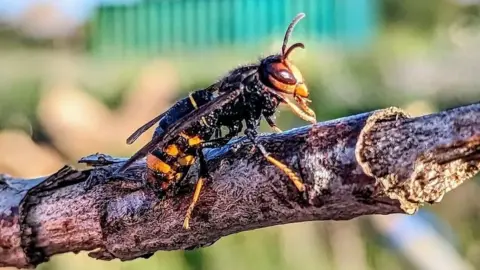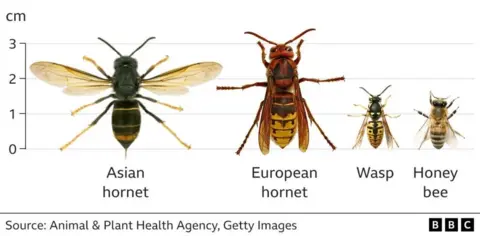
 Simon Spratley
Simon Spratley
Invasive Asian hornets have survived a UK winter for the first time, DNA analysis has confirmed, suggesting that they could make the UK one of their permanent homes.
The species poses a deadly threat to honey bees and could have a "concerning" impact on native pollinators and biodiversity were they to stay, master beekeeper Lynne Ingram told the BBC.
The insects, which can eat up to 50 bees a day, had previously flown into the UK from France in the warmer months.
"The DNA analysis has now proved they are overwintering - they could get really established here," Ms Ingram said.
DNA samples were collected from hornets captured in traps installed by the National Bee Unit in Four Oaks in the Kent area, which showed them to be the offspring of a nest destroyed in November 2023 in nearby Rye.
A single hornet nest can produce 350 queens.
Approximately 90% of these will not survive the winter, but every queen that does can seed an entire colony.
The British Bee Keepers Association is now trying to locate other nests before new queens are produced.
"We know that some of the nests we found last year, the queens had already been produced," said Ms Ingram, who is the Asian hornet teams coordinator for Somerset Beekeepers Association.
"And they leave the nests and go into hibernation for the winter, and they're very difficult to find," Ms Ingram added.
Asian hornets are native to Southeast Asia but can be transported around the world in cargo.
They are widespread in mainland Europe and France is estimated to be home to as many as 500,000 nests, according to the British Bee Keepers Association.


Like native European hornets, Asian hornets can unleash a nasty sting, but they pose no great risk to human health.
They are, however, deadly for honey bees and other crucial native pollinators.
They can consume up to 11kg of insects a year, and just one can chomp as many as 50 bees a day.
"A [honey bee] hive is like a supermarket for an Asian hornet - they just have to wait outside," Ms Ingram said.
The British Bee Keepers Association is urging the public to report sightings of the Asian hornet via the Asian Hornet Watch app.
The insect is slightly smaller than its European counterpart, distinguishable by an orange band at the base of its abdomen and striking yellow legs.
Information on how to identify an Asian hornet is available here.
How to spot an Asian hornet and what to do if you get stung
The hornet was found for the first time in the UK in September 2016.
Last year the National Bee Unit, an arm of the Department for Environment Food and Rural Affairs (Defra), said it destroyed 72 nests in 56 locations, most of which were in Kent.
"There is a high risk of this species becoming established in the UK, and it will take intensive effort to limit the speed of spread," the unit said.
Defra has said it "continues to stand ready to respond quickly and effectively to any further possible sightings”.
Nests and sightings of the insects have been found in locations including Canterbury, Rye, Folkestone Sandwich and Four Oaks.

 9 months ago
47
9 months ago
47









